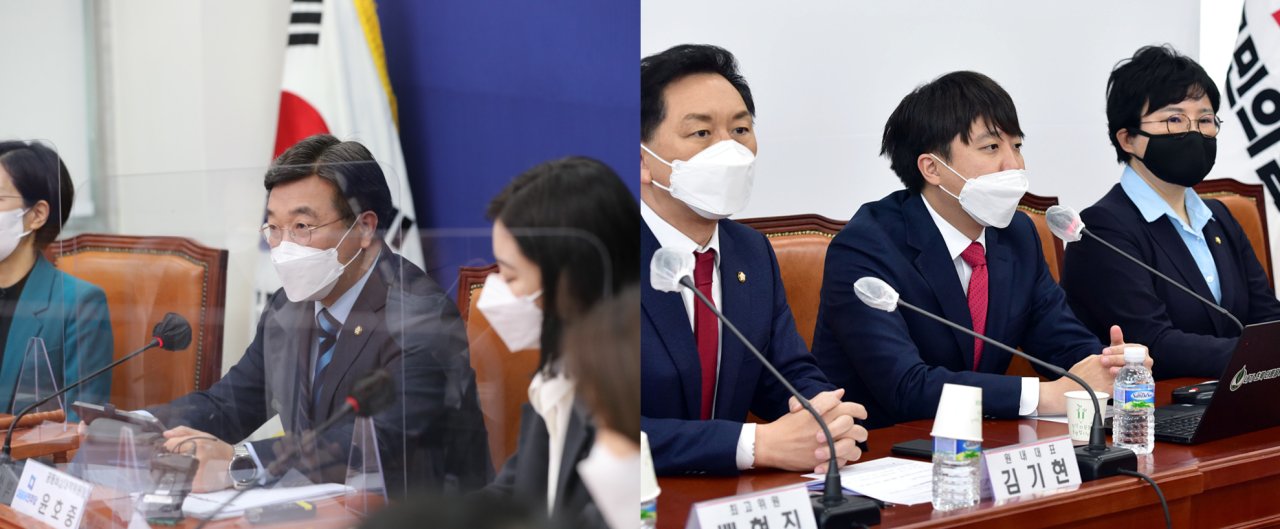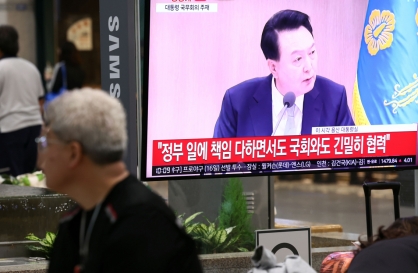[KH Explains] How parties are preparing for next election in June
People Power Party at an advantage, but close-fought presidential race raises hope for Democratic Party
By Ko Jun-taePublished : March 21, 2022 - 14:52

South Korea's political parties are readying for another key election in June, with the Democratic Party of Korea looking to stage a comeback following its narrow defeat in the presidential election.
For the local elections set for June 1, parties are competing to win 17 gubernatorial and metropolitan mayoral posts and thousands more local administrative, legislative and educational chief posts. All Koreans born before June 2, 2004, are eligible to vote.
The last local elections ended in a landslide victory for the Democratic Party, with the liberal party grabbing 14 of the 17 metropolitan mayoral and gubernatorial posts. It also swept 11 out of 12 legislative seats up for grabs in the parliamentary by-elections held on the sidelines.
The result then was largely a reflection of South Koreans’ continued trust in President Moon Jae-in and his party, but the public sentiment has since shifted, and parties are arming themselves with new strategies and new mindsets to appeal to voters.
Contenders for key posts
The conservative People Power Party is looking to score another win in the upcoming election following its success in the presidential election with the victory of President-elect Yoon Suk-yeol. The tide has been in its favor in recent years, since winning the mayoral by-elections in April 2021.
The party is hoping to win at least 10 out of 17 metropolitan mayoral and gubernatorial posts in the June election, and it is preparing to put forward well-famed candidates.
The Democratic Party, on the other hand, is determined to stage a comeback after two unsuccessful elections. The party suffered a major defeat in the mayoral by-elections and lost the presidency by a small margin.
It is not finalized yet who will run for which post, but it is believed that both parties will stage major heavyweights, some of whom competed in their presidential primaries, to compete for the 17 key posts.
Seoul Mayor Oh Se-hoon with the People Power Party is running to extend his term for another four years, and is clearly favored in all opinion surveys as the winner whomever he competes against from the Democratic Party.
The Democratic Party has been contemplating who to field against Oh, and Rep. Park Ju-min has been touted as one of the likely candidates.
Some have speculated that former Gyeonggi Province Gov. Lee Jae-myung, who lost against Yoon by a small margin in the presidential election, will join the race to revive his political career, but Lee has yet to make any public comments.
Another possible contender for the liberal bloc is former Deputy Prime Minister Kim Dong-yeon for the Gyeonggi Province gubernatorial post, while Yoo Seong-min is speculated as his competitor from the People Power Party.
Rep. Hong Joon-pyo, who previously served as governor of South Gyeongsang Province, recently announced that he will throw his hat in the ring for the Daegu mayoral post in the June election. He is expected to compete against current Daegu Mayor Kwon Young-jin and former Rep. Kim Jae-won from the same party before the winner meets its rival from the Democratic Party.
In Busan, incumbent Mayor Park Heong-joon is believed to extend his term as the city is one of the major strongholds for the conservative faction, and no candidate has been clearly named from the liberal faction.
Experts have said the Gangwon, North Chungcheong, South Chungcheong and Jeju provinces are essentially “swing voter” regions, meaning both parties stand a considerable chance at winning the respective gubernatorial posts.
It is widely believed that the Democratic Party will win the electoral posts in so-called Honam region of North Jeolla Province, South Jeolla Province and Gwangju. And the People Power Party is expected to win posts available in North Gyeongsang and South Gyeongsang provinces on top of Daegu, Ulsan and Busan.
Different focus, strategies from parties
Unlike presidential elections where campaigns are staged to have voters focus on individual candidates before their associated parties, local elections have voters focus on the image of each political party, letting them decide on their picks by calculating how approachable, clean and considerate a party looks.
While parties are competing for the same number of posts up for grabs, they are approaching the election in starkly different manners, especially with picking candidates for proportional representatives in each region.
The People Power Party is looking to appeal to voters with what they call a transparent selection system. All those looking to run as proportional representatives with the party will have to take an internal test, and only those who score within a certain percentile can be its flagbearer, it said.
The test, dubbed as the People Power Aptitude Test, is made to assess test takers’ understanding of People Power Party’s bylaws as well as the basic Korean legal system in politics and administration.
Those wanting to run as proportional representatives on the municipal level will need to score in the top 35 percent, and those aiming for metropolitan or gubernatorial levels need scores within the top 10 percent.
The party is also looking to require all of its candidates to participate in at least two debate programs.
The Democratic Party is yet to come up with clear strategies for the elections, but it is surely looking to put forward as many candidates as possible from minor and underrepresented groups like the younger generations and females. In doing so, the party hopes to paint a picture to voters that it is a group that cares about diversity and inclusion in carrying out politics for the people.
The party recently appointed a 26-year-old women’s rights activist to lead its emergency steering committee, signaling the party’s move that it would widen the scope in choosing candidates to run for mayoral, gubernatorial and councilor posts.
Who is likely to win?
Experts have consistently predicted that whichever party wins the presidential election is likely to extend its winning streak in the local elections, which means the People Power Party has higher chances of achieving a majority in June.
But as the presidential race ended with Yoon’s victory only by a small margin, some have predicted the game will not be a guaranteed win for the People Power Party. Gyeonggi Province and Incheon still voted in favor of the Democratic Party, and so did North Jeolla and South Jeolla provinces as well as Gwangju.
If the Democratic Party manages to put a stop to the internal feuding and selects a unified leadership to lead the local elections, the battle could still be fierce, even though the conservative party still has higher chances of success, they say.
For the time being, however, the liberal party is viewed as more favorable to the people, survey results show.
According a Realmeter survey of 2,521 voters conducted from March 14 to 18, the support rating for the Democratic Party stood at 41.3 percent, up 5.7 percentage points from a week earlier. The figure for the People Power Party fell 2.5 percentage points to 40.7 percent.
Experts also point to the fact that the general public will favorably view the party associated with the incoming president. Once the new president takes office, the so-called "honeymoon phase" starts for Yoon, and there is only a 20-day window for the local elections to take the spotlight.
"Voters are more likely to rally support for the new president and its friendly forces upon inauguration, which is definitely going to impact the voter sentiment in the local elections," said Eom Gyeong-yeong, director of local political think tank Zeitgeist Institute.
"And we should remember that voter turnout for the young and middle-aged population is lower in local elections, which is likely to negatively impact the Democratic Party, although some damage will be done to the People Power Party as well."
For the local elections set for June 1, parties are competing to win 17 gubernatorial and metropolitan mayoral posts and thousands more local administrative, legislative and educational chief posts. All Koreans born before June 2, 2004, are eligible to vote.
The last local elections ended in a landslide victory for the Democratic Party, with the liberal party grabbing 14 of the 17 metropolitan mayoral and gubernatorial posts. It also swept 11 out of 12 legislative seats up for grabs in the parliamentary by-elections held on the sidelines.
The result then was largely a reflection of South Koreans’ continued trust in President Moon Jae-in and his party, but the public sentiment has since shifted, and parties are arming themselves with new strategies and new mindsets to appeal to voters.
Contenders for key posts
The conservative People Power Party is looking to score another win in the upcoming election following its success in the presidential election with the victory of President-elect Yoon Suk-yeol. The tide has been in its favor in recent years, since winning the mayoral by-elections in April 2021.
The party is hoping to win at least 10 out of 17 metropolitan mayoral and gubernatorial posts in the June election, and it is preparing to put forward well-famed candidates.
The Democratic Party, on the other hand, is determined to stage a comeback after two unsuccessful elections. The party suffered a major defeat in the mayoral by-elections and lost the presidency by a small margin.
It is not finalized yet who will run for which post, but it is believed that both parties will stage major heavyweights, some of whom competed in their presidential primaries, to compete for the 17 key posts.
Seoul Mayor Oh Se-hoon with the People Power Party is running to extend his term for another four years, and is clearly favored in all opinion surveys as the winner whomever he competes against from the Democratic Party.
The Democratic Party has been contemplating who to field against Oh, and Rep. Park Ju-min has been touted as one of the likely candidates.
Some have speculated that former Gyeonggi Province Gov. Lee Jae-myung, who lost against Yoon by a small margin in the presidential election, will join the race to revive his political career, but Lee has yet to make any public comments.
Another possible contender for the liberal bloc is former Deputy Prime Minister Kim Dong-yeon for the Gyeonggi Province gubernatorial post, while Yoo Seong-min is speculated as his competitor from the People Power Party.
Rep. Hong Joon-pyo, who previously served as governor of South Gyeongsang Province, recently announced that he will throw his hat in the ring for the Daegu mayoral post in the June election. He is expected to compete against current Daegu Mayor Kwon Young-jin and former Rep. Kim Jae-won from the same party before the winner meets its rival from the Democratic Party.
In Busan, incumbent Mayor Park Heong-joon is believed to extend his term as the city is one of the major strongholds for the conservative faction, and no candidate has been clearly named from the liberal faction.
Experts have said the Gangwon, North Chungcheong, South Chungcheong and Jeju provinces are essentially “swing voter” regions, meaning both parties stand a considerable chance at winning the respective gubernatorial posts.
It is widely believed that the Democratic Party will win the electoral posts in so-called Honam region of North Jeolla Province, South Jeolla Province and Gwangju. And the People Power Party is expected to win posts available in North Gyeongsang and South Gyeongsang provinces on top of Daegu, Ulsan and Busan.
Different focus, strategies from parties
Unlike presidential elections where campaigns are staged to have voters focus on individual candidates before their associated parties, local elections have voters focus on the image of each political party, letting them decide on their picks by calculating how approachable, clean and considerate a party looks.
While parties are competing for the same number of posts up for grabs, they are approaching the election in starkly different manners, especially with picking candidates for proportional representatives in each region.
The People Power Party is looking to appeal to voters with what they call a transparent selection system. All those looking to run as proportional representatives with the party will have to take an internal test, and only those who score within a certain percentile can be its flagbearer, it said.
The test, dubbed as the People Power Aptitude Test, is made to assess test takers’ understanding of People Power Party’s bylaws as well as the basic Korean legal system in politics and administration.
Those wanting to run as proportional representatives on the municipal level will need to score in the top 35 percent, and those aiming for metropolitan or gubernatorial levels need scores within the top 10 percent.
The party is also looking to require all of its candidates to participate in at least two debate programs.
The Democratic Party is yet to come up with clear strategies for the elections, but it is surely looking to put forward as many candidates as possible from minor and underrepresented groups like the younger generations and females. In doing so, the party hopes to paint a picture to voters that it is a group that cares about diversity and inclusion in carrying out politics for the people.
The party recently appointed a 26-year-old women’s rights activist to lead its emergency steering committee, signaling the party’s move that it would widen the scope in choosing candidates to run for mayoral, gubernatorial and councilor posts.
Who is likely to win?
Experts have consistently predicted that whichever party wins the presidential election is likely to extend its winning streak in the local elections, which means the People Power Party has higher chances of achieving a majority in June.
But as the presidential race ended with Yoon’s victory only by a small margin, some have predicted the game will not be a guaranteed win for the People Power Party. Gyeonggi Province and Incheon still voted in favor of the Democratic Party, and so did North Jeolla and South Jeolla provinces as well as Gwangju.
If the Democratic Party manages to put a stop to the internal feuding and selects a unified leadership to lead the local elections, the battle could still be fierce, even though the conservative party still has higher chances of success, they say.
For the time being, however, the liberal party is viewed as more favorable to the people, survey results show.
According a Realmeter survey of 2,521 voters conducted from March 14 to 18, the support rating for the Democratic Party stood at 41.3 percent, up 5.7 percentage points from a week earlier. The figure for the People Power Party fell 2.5 percentage points to 40.7 percent.
Experts also point to the fact that the general public will favorably view the party associated with the incoming president. Once the new president takes office, the so-called "honeymoon phase" starts for Yoon, and there is only a 20-day window for the local elections to take the spotlight.
"Voters are more likely to rally support for the new president and its friendly forces upon inauguration, which is definitely going to impact the voter sentiment in the local elections," said Eom Gyeong-yeong, director of local political think tank Zeitgeist Institute.
"And we should remember that voter turnout for the young and middle-aged population is lower in local elections, which is likely to negatively impact the Democratic Party, although some damage will be done to the People Power Party as well."






![[From the Scene] Monks, Buddhists hail return of remains of Buddhas](http://res.heraldm.com/phpwas/restmb_idxmake.php?idx=644&simg=/content/image/2024/04/19/20240419050617_0.jpg&u=20240419175937)







![[From the Scene] Monks, Buddhists hail return of remains of Buddhas](http://res.heraldm.com/phpwas/restmb_idxmake.php?idx=652&simg=/content/image/2024/04/19/20240419050617_0.jpg&u=20240419175937)

![[KH Explains] Hyundai's full hybrid edge to pay off amid slow transition to pure EVs](http://res.heraldm.com/phpwas/restmb_idxmake.php?idx=652&simg=/content/image/2024/04/18/20240418050645_0.jpg&u=20240419100350)

![[Today’s K-pop] Illit drops debut single remix](http://res.heraldm.com/phpwas/restmb_idxmake.php?idx=642&simg=/content/image/2024/04/19/20240419050612_0.jpg&u=)